外研版七年级下英语M10U3学案
Module10Unit3语法导学案 外研版英语七年级下册
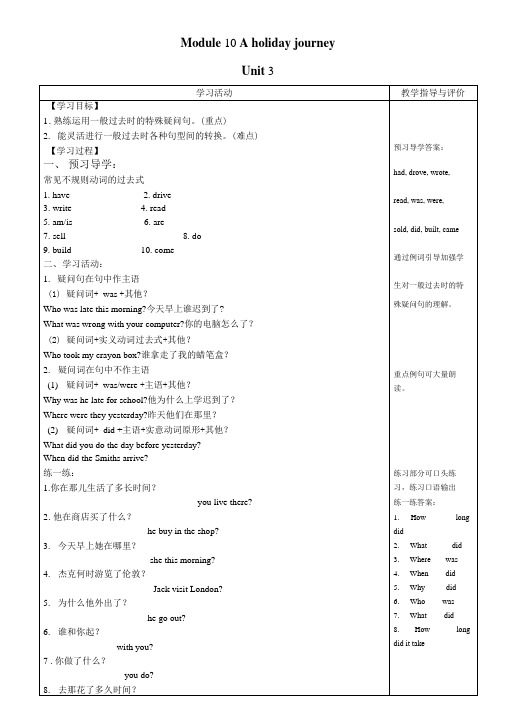
Module 10 A holiday journeyUnit 3学习活动教学指导与评价【学习目标】1.熟练运用一般过去时的特殊疑问句。
(重点)2.能灵活进行一般过去时各种句型间的转换。
(难点)【学习过程】一、预习导学:常见不规则动词的过去式1. have ______________2. drive ________________________3.write ______________4. read __________________________5. am/is ______________6. are ___________________________7.sell8. do9. build ________ 10. come二、学习活动:1.疑问句在句中作主语(1)疑问词+ was +其他?Who was late this morning?今天早上谁迟到了?What was wrong with your computer?你的电脑怎么了?(2)疑问词+实义动词过去式+其他?Who took my crayon box?谁拿走了我的蜡笔盒?2.疑问词在句中不作主语(1)疑问词+ was/were +主语+其他?Why was he late for school?他为什么上学迟到了?Where were they yesterday?昨天他们在那里?(2)疑问词+ did +主语+实意动词原形+其他?What did you do the day before yesterday?When did the Smiths arrive?练一练:1.你在那儿生活了多长时间?_______ _________ _________ you live there?2.他在商店买了什么?_______ ________ he buy in the shop?3.今天早上她在哪里?_______ ________ she this morning?4.杰克何时游览了伦敦?Jack visit London?5.为什么他外出了?_______ _________ he go out?6.谁和你起?____ _____ with you?7 .你做了什么?you do?8.去那花了多久时间?预习导学答案:had, drove, wrote, read, was, were, sold, did, built, came通过例词引导加强学生对一般过去时的特殊疑问句的理解。
外研版英语七年级下Module10 Unit3教案
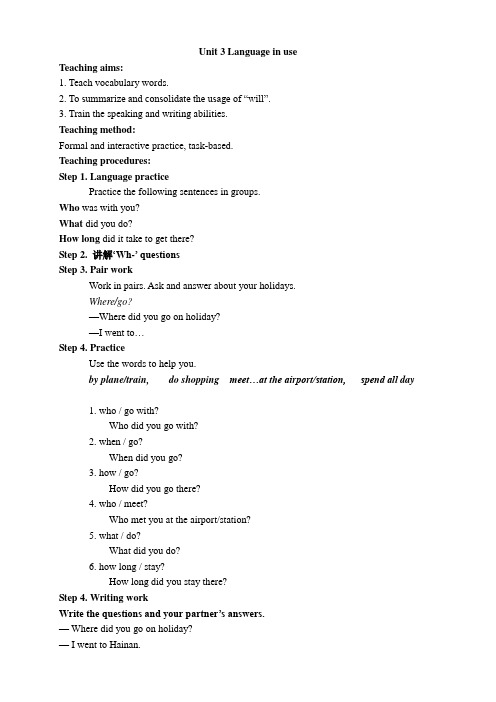
Unit 3 Language in useTeaching aims:1. Teach vocabulary words.2. To summarize and consolidate the usage of “will”.3. Train the speaking and writing abilities.Teaching method:Formal and interactive practice, task-based.Teaching procedures:Step 1. Language practicePractice the following sentences in groups.Who was with you?What did you do?How long did it take to get there?Step 2.讲解‘Wh-’ questionsStep 3.Pair workWork in pairs. Ask and answer about your holidays.Where/go?—Where did you go on holiday?—I went to…Step 4.PracticeUse the words to help you.by plane/train, do shopping meet…at the airport/station, spend all day1. who / go with?Who did you go with?2. when / go?When did you go?3. how / go?How did you go there?4. who / meet?Who met you at the airport/station?5. what / do?What did you do?6. how long / stay?How long did you stay there?Step 4.Writing workWrite the questions and your partner’s answers.— Where did you go on holiday?— I went to Hainan.Step 5.Pair workWork with a new partner. Ask and answer about your first partner.—Where did … go on holiday?—He/She went to Hainan.Step 5. Complete the postcard with the correct form of the words from the box.go, have, swim, take, visit, writeHi Mum,I’m ______ a really good time. I’m _______ this postcard at the airport.We were at the hotel for four days. We ______ in the sea, ________ some museums and ______ lots of photos. We also ______ shopping.See you soon.Lots of love,BettyStep 5.PracticeChoose the correct answer.1.Today is Wednesday, so yesterday / tomorrow was Tuesday.2.I was there last / next week.3.I’m going to travel around the world many years ago / in the future.4.They’re eating at a great restaurant right now / soon.5.The palace was not open in 1995 / 2103.Step 6. Around the worldAn interesting holiday:Step 7. WritingWrite six things you did on last holiday.On my last holiday, I bought some presents for my friends.1. _________________________________2. _________________________________3. _________________________________4. _________________________________5. _________________________________6. _________________________________Step 9. Module taskThe task of this module: Writing an email to a friend.Step 10. Ask and answerAsk and answer the following questions:—Where did you go?—To…—Who did you go with?—My family.1.How long did you stay?2.How did you get there?3.Where did you stay?4.What did you do?Step 11. Writing1. Write your answers to the questions in Activity 7..I went to …I went with…2. Write an email to your friend about your holiday.Dear…On my last holiday I …We had a great time.My aunt and uncle met me at the airport.Where did you go?How long did you spend there?Step 12. Exercise完成句子:1. 我们去年春天照了许多相。
外研版英语七年级下册Module10Unit3Languageinuse.教案设计

Module 10 My holiday journey(Revision)Teaching aims:i.Enabling Ss to read and get information about someone' soliday journey through tasks;ii.Enabling Ss to talk about their journey in the past with the target language;iii.Enabling Ss to write about their holiday journey in the past.iv.Enabling Ss to enjoy life through travelling.Teaching importance :To check and practice new words; to practice the sentence structures;To apply skills in communicating about holiday journey.Teaching difficulties :(1)Past simple irregular verbs.(2)To learn about the sentences about describing a holidayjourney.Teaching methodology •Formal and interactive practiceTeaching toolsMulti-Media (or Tape recorder, OHP)Teaching procedures:Step I Warm up and lead inSs watch a video about the teacher ' s holiday.T:Good morning,class. My name is Iris.Do you enjoy my video?You see,I like travelling and I like taking photos.How about you?Do you like travelling?Where did you go last summer? And what did you do ther eStepII PresentationT presents some pictures and phrases,guiding Ss to talk about their last summer holiday>e.g. Last summer,I went shooping on Wuma Street.Last summer, I took a walk in Lishui Street. …T invites Ss to talk about her friend hcsiday with picures and given sentence structures.Last summer holiday, he/she went to and he/she …Then T invites Ss to ask questions about her summer holiday,to arouse Ss interest in getting to know more about the teacher.Ss ask T the following questions:1.When did you go?2.Where did you go?3.How did you go there?4.Who did you go with?5.What did you do?6.How long did you stay there?7.How did you feel ?StepIII ReadingTask1:Read about Iris holid ay and fill in the blanks.I (1) (拥有)a great journey last summer.I (2) (去)to Shanghai with my friend Linda. It ' s a beautiful modern city. We (3) (至U达)by plane. On the first day, we (4) (参观)Shanghai Ocean Aquarium. We also (5)(拍照)photos with the sea animals. On the next day, we went up to the of the Oriental Pearl Tower. We were really excite dOn the last day, we (6) (买)some clothes and ⑺ (吃)a lot of Shanghai food. The food (8) (M) delicious.I ⑼ (感到J) happy and I ' mooking forward tovisiting there again.Ss read the sentences one by one and give the answer.T corrects thewrong pronunciations and finally Ss read verb pairs together aloud.{have-had go-went arrive-arrived visit-visited take-tookbuy-bought eat-ate be-was/were feel-felt} …Task2: Read about Iris holiday again and answer the questions.1.When did Iris go?2.When did she go?3.Where did she go?4.How did she go there?5.Who did she go with?6.What did she do?7.How long did she stay there?8.How did she feel?Task2: Retell Iris holiday with the note card given.happyTask3.PairworkSs work in piars .Ask and answer questions with their own note card made . Ask and answer:How/feel?1:- When did you go?2:-Where did you go?3:-Who djd. you go with ?4:-How djd. you go there?5:-What did you do_ there?6:-How long did you stay there 7:-How did you feel? -I went …-I went to.-I went with.-I went there by. -I,and-I stayed there for -I felt.StepIV Writinga.T introduces the structures of the target passage.Howto write about“ My holiday journey ” . T explains the beginning ,body and ending part,as below: b .Ss write about their holiday journey according to their own note card.(根据表格信息要点写1篇游记。
初一英语(外研版)-M10 Unit 3 Language in use-1教案
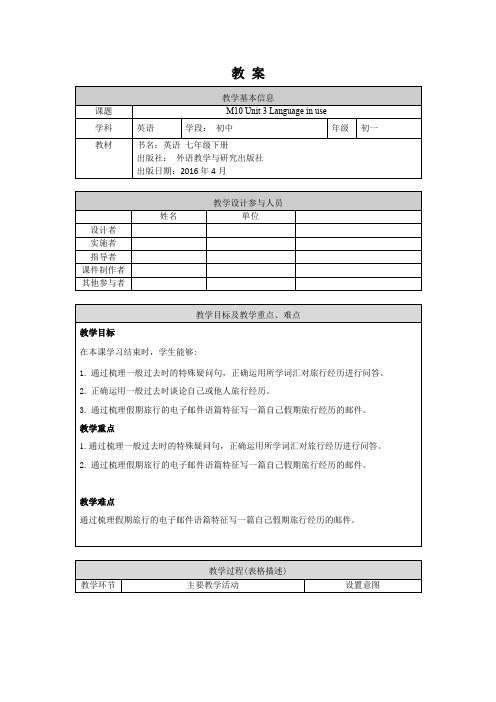
教学环节
主要教学活动
设置意图
总结语法结构和意义、电子邮件格式和特征
1.学生通过观察句子,梳理总结出一般过去时的特殊疑问句基本结构。
2.学生梳理上一单元所学关于假期旅行的电子邮件语篇特征。
引导学生能够通过观察句子,总结语法结构,理解语法意义。
引导学生回顾假期旅行的电子邮件语篇特征。
布置作业
1.复习笔记并完成任务单。
2.给Betty写一封电子邮件,介绍自己一次国内的旅行经历。
巩固课上学习内容,用所学的语言和知识做事情的能力,实现迁移创新。
运用语言知识完成真实任务
1.学生阅读Betty邮件,思考主要包括哪些方面内容,老师以一般过去时的特殊疑问句形式呈现。
2.学生思考回顾自己的假期旅行经历。
3.学生学习范文,进一步明确如何写自己的旅行经历,总结如何介绍一次旅行经历,形成结构化新知。
创设情境,促进学生用所学的语言和知识做事情的能力,实现迁移创新。
2.正确运用一般过去时谈论自己或他人旅行经历。
3.通过梳理假期旅行的电子邮件语篇特征写一篇自己假期旅行经历的邮件。
教学重点
1.通过梳理一般过去时的特殊疑问句,正确运用所学词汇对旅行经历进行问答。
2.通过梳理假期旅行的电子邮件语篇特征写一篇自己假期旅行经历的邮件。
教学难点
通过梳理假期旅行的电子邮件语篇特征写一篇自己假期旅行经历的邮件。
教 案
教学基本信息
课题
M10 Unit 3 Language in use
学科
英语
学段:初中
年级
初一
教材
书名:英语七年级下册
出版社:外语教学与研究出版社
出版日期:2016年4月
外研社版初中英语七年级下册Module 10 Unit 3 教案
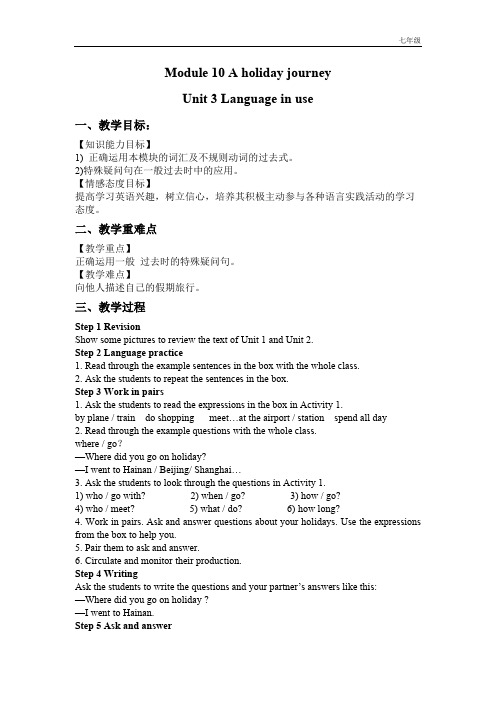
Module 10 A holiday journeyUnit 3 Language in use一、教学目标:【知识能力目标】1) 正确运用本模块的词汇及不规则动词的过去式。
2)特殊疑问句在一般过去时中的应用。
【情感态度目标】提高学习英语兴趣,树立信心,培养其积极主动参与各种语言实践活动的学习态度。
二、教学重难点【教学重点】正确运用一般过去时的特殊疑问句。
【教学难点】向他人描述自己的假期旅行。
三、教学过程Step 1 RevisionShow some pictures to review the text of Unit 1 and Unit 2.Step 2 Language practice1. Read through the example sentences in the box with the whole class.2. Ask the students to repeat the sentences in the box.Step 3 Work in pairs1. Ask the students to read the expressions in the box in Activity 1.by plane / train do shopping meet…at the airport / station spend all day2. Read through the example questions with the whole class.where / go?—Where did you go on holiday?—I went to Hainan / Beijing/ Shanghai…3. Ask the students to look through the questions in Activity 1.1) who / go with? 2) when / go? 3) how / go?4) who / meet? 5) what / do? 6) how long?4. Work in pairs. Ask and answer questions about your holidays. Use the expressions from the box to help you.5. Pair them to ask and answer.6. Circulate and monitor their production.Step 4 WritingAsk the students to write the questions and your partner’s answers like this:—Where did you go on holiday ?—I went to Hainan.Step 5 Ask and answer1. Work with a new partner.2. Ask and answer questions about your first partner like this:—Where did he / she go on holiday ?—He / She went to Hainan.Step 6 Complete the postcard1. Ask the students to read the words in the box in Activity 4.go have swim take visit write2. Ask the students to complete the postcard with the correct form of the words from the box in Activity 4.3. Check with a partner.4. Call back the answers from the whole class.5. Learn how to write a postcard.Step 7 Choose the correct answer.1. Ask the students to read through the sentences in Activity 5.1) Today is Wednesday, so yesterday / tomorrow was Tuesday.2) I was there last / next week.3) I’m going to travel around the world many years ago / in the future.4) They’re eating at a great restaurant right now / soon.5) The palace was not open in 1995 / 2103.2. Choose the correct answer.3. Ask the students to check with a partner.4. Check the answers:Step 8 Writing.Write six things you did on your last holiday.On my last holiday, I bought some presents for my friends.1___________________________________2___________________________________3 ___________________________________4 ___________________________________5 ___________________________________6 ___________________________________Step 9 Around the world: An interesting holiday1. Ask the students to look at the picture and discuss what they can see.2. Read through the information with the whole class.3. Talk something about an interesting holiday.4. Read the passage together.Step 10 Module task: Writing an email to a friend about your holiday1. Work in pairs. Ask and answer questions about your last holiday.—Where did you go ?—To…—Who did you go with ?— My family.1) How long did you stay ? 2) How did you get there ?3) Where did you stay? 4) What did you do ?2. Write your answers to the questions in Activity 7.I went to…I went with…Step 11 Grammar语法点拨——一般过去时之特殊疑问句:在一般过去时中,会出现以疑问词开头,对句中某一成分提问的句子。
新外研版七年级下册英语 Module 10 Unit 3 教案(教学设计)
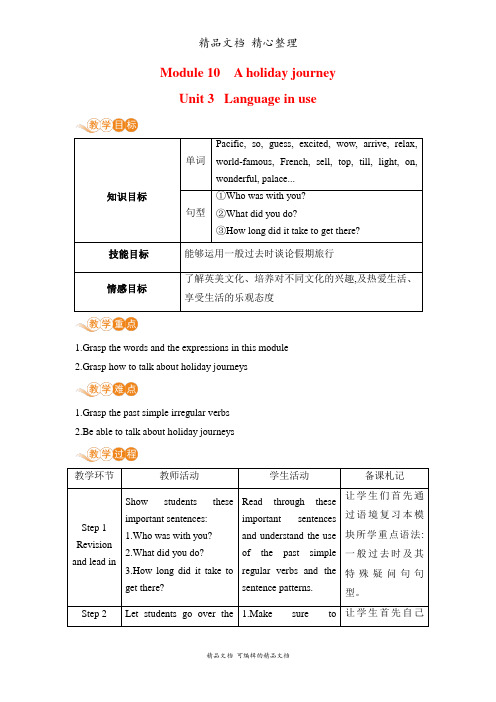
6.On my last holiday I helped Uncle Wang pick apples.
1.Write six things they did on their last holiday.
2.Work in pairs to check each other’s sentences.
3.—When did you go?
—I went there last summer.
4.—How did you get there?
—I got there by air.
5.—Who did you meet?
—I met Liu Xiang.
6.—What did you do?
—I went swimming in the sea.
4.—Who did you meet?
—I met my father’s classmate at the airport.
5.—What did you do?
—I did some shopping.
6.—How long did you stay?
—I stayed for a week.
On my last holiday I bought some presents for my friends.
_____________________________________________________
【参考答案】
1.On my last holiday I visited my grandparents in the countryside.
外研版七年级英语下册《Module 10 Unit 3 Language in use》教学设计
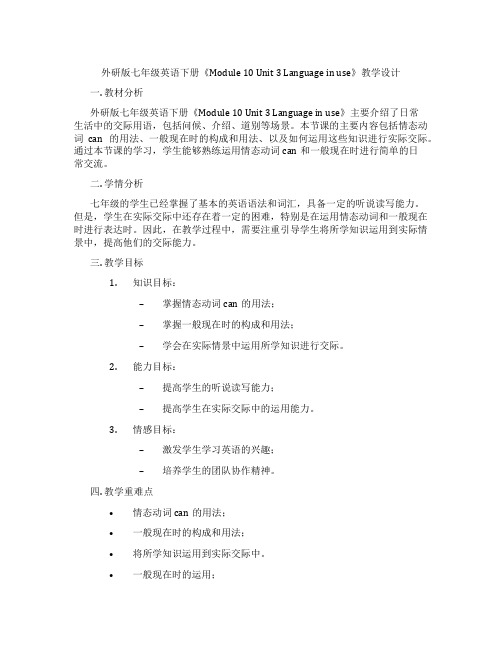
外研版七年级英语下册《Module 10 Unit 3 Language in use》教学设计一. 教材分析外研版七年级英语下册《Module 10 Unit 3 Language in use》主要介绍了日常生活中的交际用语,包括问候、介绍、道别等场景。
本节课的主要内容包括情态动词can的用法、一般现在时的构成和用法、以及如何运用这些知识进行实际交际。
通过本节课的学习,学生能够熟练运用情态动词can和一般现在时进行简单的日常交流。
二. 学情分析七年级的学生已经掌握了基本的英语语法和词汇,具备一定的听说读写能力。
但是,学生在实际交际中还存在着一定的困难,特别是在运用情态动词和一般现在时进行表达时。
因此,在教学过程中,需要注重引导学生将所学知识运用到实际情景中,提高他们的交际能力。
三. 教学目标1.知识目标:–掌握情态动词can的用法;–掌握一般现在时的构成和用法;–学会在实际情景中运用所学知识进行交际。
2.能力目标:–提高学生的听说读写能力;–提高学生在实际交际中的运用能力。
3.情感目标:–激发学生学习英语的兴趣;–培养学生的团队协作精神。
四. 教学重难点•情态动词can的用法;•一般现在时的构成和用法;•将所学知识运用到实际交际中。
•一般现在时的运用;•在实际交际中灵活运用情态动词和一般现在时。
五. 教学方法1.任务型教学法:通过设置各种实际交际任务,引导学生运用所学知识进行交流,提高他们的实际交际能力。
2.情境教学法:创设各种生活情境,让学生在真实的环境中感受和理解一般现在时和情态动词的用法。
3.互动式教学法:引导学生积极参与课堂活动,鼓励他们大胆开口说英语,提高他们的听说能力。
六. 教学准备1.教材:外研版七年级英语下册《Module 10 Unit 3 Language in use》。
2.课件:制作课件,包括图片、动画、视频等素材,以便于生动展示教学内容。
3.教学道具:准备一些日常用品,如玩具、衣物等,用于创设生活情境。
外研版七年级下册英语 Module 10 UNIT 3 Language in use导学案设计 (
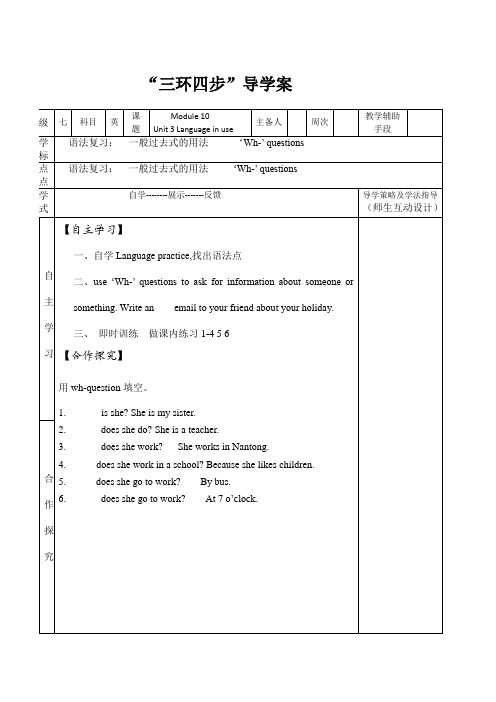
When did Betty go to Los Angeles?
【反馈检测】
A)按要求变化下面的句子,每空一词。
1. Jenny saw a film last night.(对划线部分提问)
_____ ____ Jenny ___ last night?
程
四
步
设
计
交
流
展
示
【交流展示】
一般过去时的特殊疑问句
How long did it take to get there?
Who was with you?
What did you do?
How did Betty get to Los Angeles?
Why was Betty excited at Disneyland?
2. Tony bought something in that store yesterday. (改为同义句)
Tony ___ _____ _________ in that store yesterday.
3. We visited Beijing last summer. (对划线部分提问)
____ ____ di
6. I wrote some postcards and sent some emails.(改为否定句)
I ______ ______ ______ postcards ______ ______ ______ emails.
3三、即时训练做课内练习1-4 5 6
【合作探究】
用wh-question填空。
1.______ is she? She is my sister.
- 1、下载文档前请自行甄别文档内容的完整性,平台不提供额外的编辑、内容补充、找答案等附加服务。
- 2、"仅部分预览"的文档,不可在线预览部分如存在完整性等问题,可反馈申请退款(可完整预览的文档不适用该条件!)。
- 3、如文档侵犯您的权益,请联系客服反馈,我们会尽快为您处理(人工客服工作时间:9:00-18:30)。
Module 10 Life history
Unit 3 Language in use学案
2010/05/20
一、学习目标
1. 识记以下单词和词组:Cambridge, travel, snow, marry, computer games, be in colour, many channels, cell phones, satellite TV
2. 掌握下列重点句子
Did you listen to the radio? Yes, I did. / No, I didn’t.
We didn’t travel by car.
二、学习重难点
1. 动词一般过去时态的一般疑问句及其肯定、否定回答
2. 复习动词一般过去时态的否定句
三、自主学习
找出下列词组
1.听收音机_______________
2. 玩电脑游戏________________
3. 乘火车旅行_______________
4. 在学校使用电脑____________
5. 有很多频道______________
6. 彩色的______________
7. 骑自行车上学______________ 8. 使用移动电话______________
9. 去国外度假______________ 10. 卫星电视和网络______________
四、当堂练习
据意写词
1.Did you _________ ____ ________ ____ (骑自行车上学) school when you _______ a boy ?
2.Did you _________ ______________ (看电视)? No, we __________ ____ ____ _________
(听收音机).
3.Did you ________ ____________ ________ (玩电游)? No. There ________ computers
________ (那时没电脑).
4.Did you __________ ____ car (乘汽车旅行)? No, We _________ _____ _________ (乘火车
旅行).
5.Cars were (贵) so people (使用自行车) or ____________ (旅行) b y bus and train .
五、课后巩固
A.单项选择
1. is the third month of the year.
A. January
B. February
C. March
D. April
2. My penfriend was born July 5th, 1992.
A. in
B. at
C. on
D. from
3. Winter usually November January.
A. lasted from; to
B. lasts from; to
C. lasted for; to
D. lasting from; at
4. There are twelve in a year.
A. days
B. weeks
C. months
D. minutes
5. ---- was she born ? --- 199
6.
A. When; in
B. When; on
C. Where; in
D. Where; on
6. the age of thirteen, he started the piano.
A. On; play
B. At; playing
C. At; plays
D. On; playing
7. Do you enjoy books?
A. seeing
B. to see
C. reading
D. to read
8. Bill Mary in 2005.
A. marry to
B. marry
C. married to
D. married
9. He decided a great writer.
A. to be
B. being
C. have
D. to have
10. They the Great Wall yesterday and they very happy.
A. visited; are
B. visit; are
C. visit; was
D. visited; were
11. One of in China Hangzhou.
A. the most beautiful cities; is
B. the most beautiful city; are
C. the beautiful cities; is
D. most beautiful city; are
12. They use cell phones computers in the past.
A. didn’t; and
B. don’t; or
C. aren’t;.so
D. weren’t; but
B.完成句子:
1. They did some shopping yesterday .(否定句)
They shopping yesterday .
2. He returned to Beijing last week .(一般疑问句,并作否定回答)
he to Beijing last week ? , he . 3. She was at home last night .(一般疑问句)
she at home last night?
4. He did his homework at home yesterday evening. (划线提问)
he at home yesterday evening ?
5. They had lunch at school last week. (划线提问)
they lunch last week ?
6. He decided to be a teacher when he was a child . (划线提问)
he when he was a child? 7. Mr Li began to teach English when he was nineteen years old. (同义句)
Mr Li began to teach English nineteen.
8. She takes a subway to school every day . (同义句)
She every day.。
